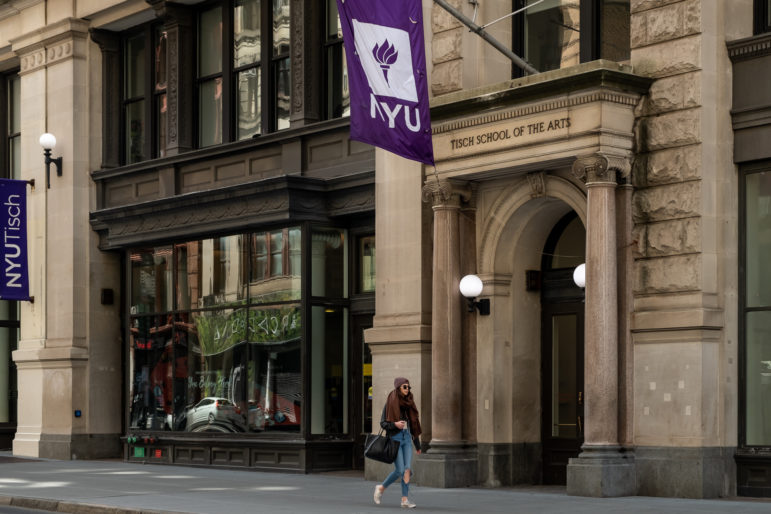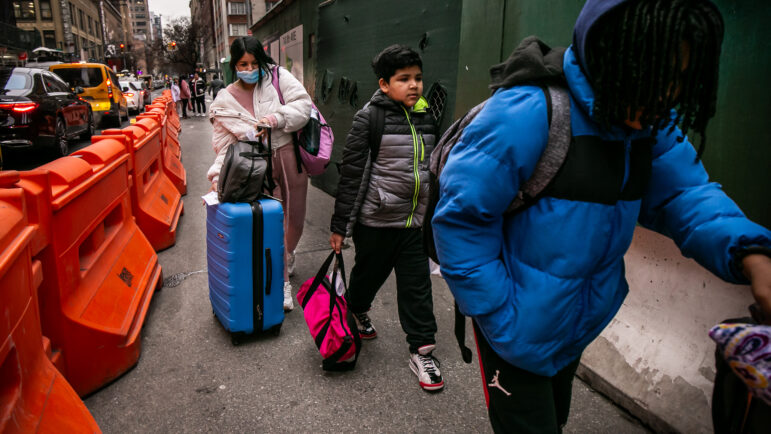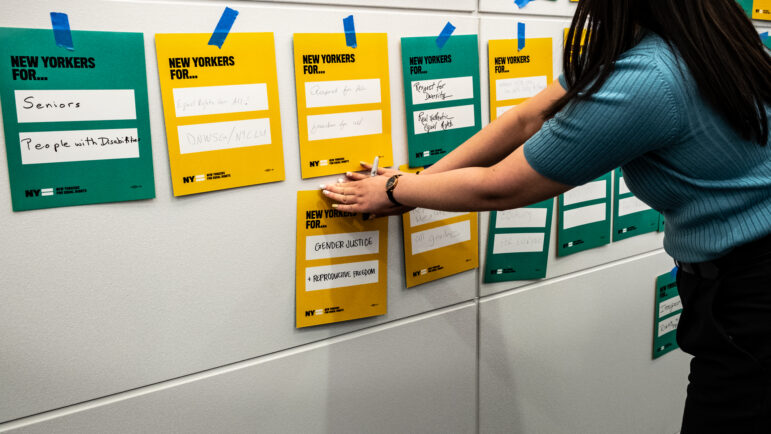
Adi Talwar
NYU Tisch School of the Arts, where learning went remote in March in response to coronavirus.This story was produced as part of the City Limits Accountability Reporting Initiative for Youth (CLARIFY) program.
Before the COVID-19 pandemic struck, a typical school day for Alicia Oh, a second year drama student at New York University’s Tisch School of the Arts, involved a lot more people — and a lot fewer screens.
“Before class, we would put our phones in a phone basket so there is as limited amount of distraction as possible,” Oh says of one of her acting classes, which used to take place in-person in an NYU studio space on Wall Street. But since March, when she and other students across the city shifted to remote-only learning in response to coronavirus learning, classes have been largely nothing but screens, often at home and far away from campus.
“I usually just stay in my room so I don’t disturb my family and wait for class to start. Sometimes, class will be cut slightly shorter because of internet connectivity issues from either my end or the professors’ end,” Oh says. A movement class she’s taking, which before COVID-19 involved “jumping around, using our bodies to create pieces and interacting with one another,” now consists of students presenting projects on actors.
“The energy of class shifted almost completely,” she says. “There’s a literal disconnection between the work we’ve done as actors because of the screen separating us.”
As the spring semester draws to a close, the city’s college students are wrapping up their first semester of online learning under an unprecedented pandemic, and the transition hasn’t been easy for many. But for certain college majors — those which rely heavily on on hands-on learning, or access to specific campus facilities or equipment — it’s been especially jarring, since classes like science labs and acting workshops don’t translate so easily to Zoom.
“Most everything can be ‘learned’ with distance learning but my lab class is a train wreck,” says Emily Krask, a freshman biomedical engineering major at CUNY’s City College (CCNY), where in-person lab classes have been replaced by students completing extensive lab reports and watching science simulations online.
“Many labs require hands-on learning and performing experiments, which cannot be done virtually,” says Marilyn Mathews, a sophomore who’s majoring in biotechnology at CCNY. Since classes there moved remote in March, her professors have been using software like Zoom and Blackboard Collaborate and to simulate experiments using data that former students collected in previous semesters.
“Instead of actually performing the experiment, our TA gives us a summary of the lab and we follow along with our lab manuals. Then, we’re shown videos and images of the experiment and how it would’ve looked if we were to perform it,” she explains.
In another biology class, students are being asked to type up reports in lieu of doing actual experiments.
“There’s a lack of exposure to lab materials and learning to follow lab procedure,” Mathews says. “I used to have lab partners, but now there’s no need.”
Kristina Ang, a sophomore studying fashion design at Parsons School of Design, has faced similar logistical challenges in trying to complete her assignments without the fabrics, patterns, sewing facilities and other equipment she’d previously been able to access on campus.
“Patterns, which can be most easily described as the parts that make up a look, are typically drawn/printed in life-sizes. So the biggest challenge for me was getting these patterns done at home where I don’t have access to large plotter printers at school,” Ang told City Limits. “I ended up having my designs sent to be printed out at FedEx, which took over a week and over $40 to be printed.”
She also ran into trouble acquiring fabric for her school projects, since shops are closed and she wasn’t able to get any delivered in time for her deadline.
“I had to think logically and use stuff that I already had at home,” Ang says. “I ended up making my designs out of bedsheets.”
Other have been similarly flexible in adjusting to their new classroom constraints, and stretching their creativity. Oh says she and her fellow acting students have been working to “bring life” into their new online-only platform: despite some time lags because of internet connectivity, students have been working to anticipate when lines will be said so there are no awkward pauses in scenes, as well as miming the physical actions that would have been performed had they all been together in person.
But she feels this is only a temporary solution.
“There is truly nothing like the real thing of being up on a stage and having an ensemble together, and that kind of hurts to think about,” she says.
“I do not think it’s feasible at all to get a quality education in acting online,” she added. “I’m really not a fan of that idea especially since I am attending a pretty expensive university and paying the same amount of money just isn’t logical to me at all.”
Oh isn’t the only student to feel this way. Christina Rynasko, whose daughter is also a student at NYU’s Tisch School of the Arts, filed a $5-million class-action lawsuit alleging that the move to online delivery does not warrant the steep tuition prices the institution charges. The suit claims breach of contract, stating the online options being offered are “subpar in practically every aspect, from the lack of facilities, materials, and access to faculty,” according to Patch. NYU has stated its intent to fight the suit.
More than 5,000 people have also signed a petition to have the arts school specifically issue tuition refunds.
“While we appreciate the concerted efforts of our professors to salvage what’s left of our education, we reject the assumption that an online Zoom education is equitable in content and value,” the petition reads.
It’s still unclear whether the city’s college and universities will resume in-person classes in the fall, and some students are rethinking their plans for next year if it doesn’t happen.
“There have been rumors that next semester is going to possibly be online as well and if that is the case, I’m probably going to take a gap semester,” says Ang, the fashion major. If she does, she says she’ll use that time as an opportunity to work on projects of her own until classes go back to normal.
“I think this period of time is allowing us all to realize a lot about ourselves and the way we work,” she says. “For better or for worse, I think we’re all going to come out of this experience a lot stronger than when we came in, so I’m just really rooting for all the students out there that are struggling to get past this.”








